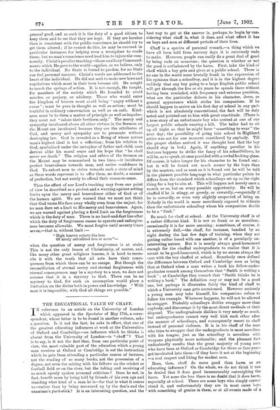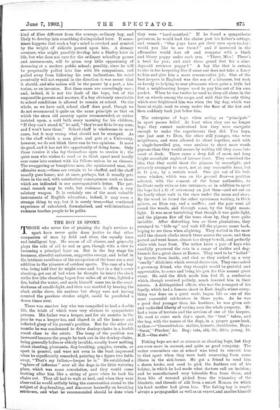THE EDUCATIONAL VALUE OF CHAFF.
IN reference to an article on the University of London which appeared in the Spectator of May 17th, a corre- spondent, whose letter is to be found in another column, asks a question. Is it not the fact, he asks in effect, that one of the greatest educating influences at work at the Universities of Oxford and Cambridge—an influence which he thinks is absent from the University of London—is " chaff " ? That is to say, is it not the fact that, from one particular point of view, the most valuable part of the education which a young man receives at Oxford or Cambridge is not the instruction which he gets from attending a particular course of lectures, not the reading of so many books, not the possession of a degree, not even the mixing with his fellows on the cricket or football field or on the river, but the taking and receiving of so much openly spoken personal criticism ? Does he not, in fact, benefit more by being told by friends of his own age and standing what kind of a man he is—for that is what it comes to—rather than by being measured up by the don's and the examiner's yard-stick ? It is an interesting question, and the best way to get at the answer is, perhaps, to begin by con- sidering what chaff is, what it does, and what effect it has on boys and men at different periods of their lives.
Chaff is a species of personal remark,—a thing which we have all been told from nursery days it is extremely rude to make. However, people can easily do a great deal of good by being rude on occasions ; the question is whether or not the good is outbalanced by the harm. First, take the kind of chaff which a boy gets and gives at a public school. There is no one in the world more brutally frank in the expression of his opinions than a schoolboy, and it is in the highest degree
unlikely that any boy going to a large English public school will get through the five or six years he spends there without having been reminded, with frequency and extreme precision, what are the particular defects in his character, dress, or general appearance which strike his companions. If he should happen to arrive on his first day at school in any garb which is not absolutely conventional, the fact will be duly noted and pointed out to him with great exactitude. (There is a true story of an unfortunate boy who arrived at one of our largest public schools wearing a kilt. The tailor had to sit up all night so that he might have "something to wear" the next day; the possibility of going into school in Highland attire was not for one moment considered by anybody. Till the proper clothes arrived it was thought best that the boy should stay in bed.) Again, if anything peculiar in his features happens to strike the fancy of his schoolfellows, he will be, so to speak, at once provided with a verbal looking-glass. Of course, it takes longer for his character to be found out : but it will be found out much sooner by the boys than by the masters, and as soon as it is found out he will be told in the plainest possible language in what particular points he differs from the standard which schoolboys set up as the right thing for a boy to aim at. This will happen not merely once a month or so, but on every possible opportunity. He will be chaffed if he is stingy, or greedy, or cowardly,—especially if he is cowardly, or even very slightly suspected of being so. Nobody in the world is more mercilessly exposed to ridicule than the unfortunate schoolboy whom his companions decide to be a " funk."
So much for chaff at school. At the University chaff is of a rather different kind. It is not so frank or so merciless; occasionally it is far more amusing; sometimes, of course, it is extremely dull,—the chaff, for instance, bandied by an eight during the last few days of training, when they are getting rather bored with one another, is of a peculiarly un- interesting nature. But it is nearly always good-humoured enough for the chaffed undergraduate to realise that it is meant to be good-humoured, which is by no means always the case with the boy chaffed at school. Somebody once defined the difference between Oxford and Cambridge men as being that at Oxford when a man writes a book his fellow-under- graduates remark among themselves that "Smith is writing a book" ; at Cambridge they remark that "Smith thinks he is writing a book." The definition may or may not be a good one, but perhaps it illustrates fairly the kind of chaff to which a University man gets accustomed. However seriously a young man may take himself, his companions refuse to follow his example. Whatever happens, he will not be allowed to swagger. Probably schoolboys dislike swagger more than anybody, and discourage it by the most direct methods at their disposal. The undergraduate dislikes it very nearly as much. but undergraduates cannot very well kick each other after the manner of schoolboys, and consequently resort to chaff instead of personal violence. It is in his chaff of the man who tries to swagger that the undergraduate is most merciless with his tongue, just as the schoolboy is merciless with weapons physically more noticeable; and the pleasant fact undoubtedly results that the great majority of young men who have been at Oxford or Cambridge for three or four years get inculcated into them—if they have it not at the beginning —a real respect and liking for modest men.
Does, then, chaff do more good than harm as an educating influence ? On the whole, we do not think it can be denied that it does good immeasurably outweighing the harm. Yet none the less there is no doubt that it does harm, especially at school. There are some boys who simply cannot stand it, and unfortunately they are in most cases boys with something of genius in them, or at all events made of a kind of fibre different from the average, ordinary boy, and likely to develop into something distinguished later. It some- times happens that such a boy's mind is crushed and stunted by the weight of ridicule poured upon him. A dreamy creature, who might possibly develop into a Shelley later in life, but who does not care for the ordinary schoolboy games and amusements, will be given very little opportunity of dreaming at a modern public school; possibly, since he will be perpetually pulled into line with his companions, and pulled away from following his own inclinations, his mind eventually will not expand in the direction it was meant that it should, and sthe nation will be the poorer by a poet, a his- torian, or an inventor. But these cases are exceedingly rare ; and, indeed, it is not the fault of the boys, but of the responsible parents and masters, if a. boy obviously unsuitable to school conditions is allowed to remain at school. On the whole, as we have said, school chaff does good, though we do not recommend it quite on the same principle as that on which the stern old country squire recommended, or rather insisted upon, a cold bath every morning for his children. "If they can't stand it," he said, " they're not fit to be my sons, and I won't have them." School chaff is wholesome in most cases, but it may cramp what should not be cramped. As to the chaff which a man gives and gets at a University, however, we do not think there can be two opinions. It must do good, and it has not the opportunity of doing harm. Only those receive it who lay themselves open to receive it ; the quiet man who wishes to read or to think apart need hardly ever come into contact with his fellows unless he so chooses. The swaggering or bumptious man, the opinionated man, the offensive man,—these are certain to be chaffed, and the chaff usually goes home ; not at once, perhaps, but it usually gets there in the end, with satisfactory consequences such as those which are indicated in our correspondent's letter. The per- sonal remark may be rude, but rudeness is often a very salutary weapon. It is certainly one of the most valuable instruments of English education ; indeed, it may seem a strange thing to say, but it is surely true,—that continued experience of calculated, formularised, and well-intentioned rudeness teaches people to be polite.







































 Previous page
Previous page